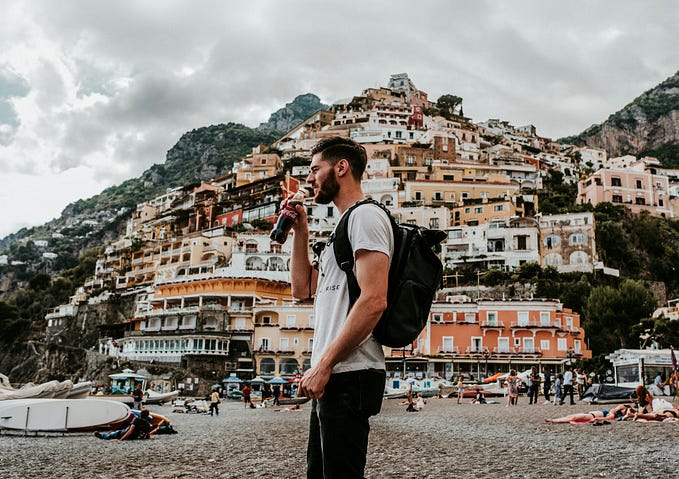The story of Paden City is one ‘as old as West Virginia’
Inside a community’s struggle for safe water and food amid a global pandemic

Crises are compounding for the people of Paden City, West Virginia, a small town of around 3,000, where residents already were living under a state of emergency because of a decades-long struggle for safe drinking water before Gov. Jim Justice’s March 16 statewide declaration in response to the coronavirus pandemic.
“Our town is in a double state of emergency,” a petition recently sent to the governor by Paden City residents states. “Not only are we worried along with the rest of the country about quarantining and staying safe from the (coronavirus), we are (also) at high risk because we are left to consume contaminated water because we can’t afford to buy it, we can’t go out to buy it, (and) if we do, the shelves are empty.”
The petition was signed by 484 residents of Paden City, including Mayor Clyde Hochscrasser, and calls on the governor to use his power to ensure residents are supplied safe drinking water, which would likely be delivered by the National Guard. Paden City residents have not had access to safe drinking water since March 14.
Although Justice only declared a state of emergency for Paden City in February this year, residents of the town have for decades been skeptical of the safety of their water supply — and for good reason.
The city’s water supply has long been contaminated with the dangerous chemical tetrachloroethylene, or PCE. EPA standards state that levels higher than 5 micrograms per liter of water are unsafe for human consumption. Recent investigations have revealed that as recently as 2013, Paden City’s water supply showed levels of PCE as high as 49.6. Paden City residents were not informed of this toxicity when it was discovered.
Nor were they informed of this year’s emergency declaration on February 4 following a more recent investigation reported by the local newspaper again showing unsafe levels of PCE.
“On Feb. 3, a large crowd of residents attended the city council meeting to get information about our water. People were very upset at that meeting, and this is when we started getting mixed messages from our mayor about his plans to help our town get clean drinking water,” Patty Wright, a resident of Paden City, said. “It wasn’t until Feb. 20 that we learned that the Governor had declared a state of emergency on Feb. 4. Yet the mayor stated in a public town meeting on Feb. 22 that he learned of the state of emergency at the same time we did when it came out in the paper.”
It wasn’t until the second week of March when Paden City residents were informed the mayor had decided to place two 500-gallon “water buffaloes” on one side of town for residents to access safe water. However, many residents still were unable to access the water because it was only available for a few hours in the middle of the day while most were busy working, and many of those not at work had no access to a vehicle and were unable to carry the water for long distances. Even those fortunate enough to access the water said it was still not safe.
“On March 12, a local resident posted (to social media) a picture of light tan water she had gotten from the buffaloes, and word was shared that the water was obtained by the mayor from a neighboring town, New Martinsville, which also showed high levels of PCE and other contaminants,” Wright said.

The water buffaloes were taken away after only a few days, then returned after several more days and then taken away again on March 20 due to concerns related to the coronavirus pandemic. Shortly following the buffaloes being taken away the first time, local activists began circulating a petition to the governor, which they say would have garnered even more signatures if citizens currently were not forced to social distance and quarantine because of the coronavirus pandemic.
Wright said that although Mayor Hochscrasser signed the petition that was sent to the governor, locals are not satisfied with his handling of their struggle for safe water.
“Even though the mayor had signed the petition, communication (we) received from Homeland Security stated that just two days prior, on March 31, the mayor said that we did not need more water because it was not being used, and because PCE levels had gone down to an average of 7.9 ppb, which is still above the acceptable level of 5 ppb,” Wright said. “I have been told on at least two occasions that the mayor has refused water for our town and that he has stated that he still drinks it and does not have any concerns about the harm from this contaminant.”
Asked whether he had spoken to someone from Homeland Security on March 31, Mayor Hochscrasser said he “(does) not remember dates.” He said he did not tell anyone from Homeland Security that Paden City does not need more clean water. Asked why residents of Paden City believe he had said precisely that, the mayor said “They don’t know what they’re talking about.”
“Many people do not find him to be truthful and have lost trust in him as our city leader,” Wright said.
The struggle of Paden City activists to gain the attention and wholehearted support of their mayor is a mere microcosm of the issues that always have faced West Virginians fighting to protect their natural environment.
Just last year, the state legislature passed a water quality bill which failed to update the state’s water quality standards and instead kept in place standards based on decades-old data. The argument used by the West Virginia Manufacturers Association was essentially that West Virginians are fatter, drink less water and eat less fish than average Americans, so their bodies can handle more contamination while simultaneously consuming less than average.
“The reason legislators did not update the standards is because they were lobbied by the West Virginia Manufacturers Association,” Delegate Evan Hansen (D- Monongalia, 51), minority vice chair of natural resources, said at the time. “It’s very clear, and the Manufacturers Association was not secretive about it.”
Additionally, a recent notice from the W.V. Rivers Coalition states that the WVDEP is proposing to weaken the state’s standard for PCE. The WVDEP’s proposal would allow for ten times more contamination than is already allowed.
Despite dealing with decades-old standards and ever-increasing opposition from big-money lobbyists, Paden City residents have continued to exemplify once more the damning reality that countless communities across West Virginia — across America — are constantly forced to innovate out of necessity, to make amends for a government that has seemingly abandoned them altogether, leaving them stranded, forsaken and confused. But they are fearful of what may come next.
“Unfortunately, it is not new to us in West Virginia to have to face a crisis head-on without real leadership, (and) no one in the state knows this better than the people of Paden City,” candidate for governor Stephen Smith said during a recent online town hall with activists from Paden City. “It’s a horrifying situation (…) It’s a story as old as West Virginia.”
As early as March last year, local activists Tonya Shuler, Lisa Davis, Rachel Cain and Zoa Postlethwait have been organizing to ensure residents of Paden City have at least some access to safe water. That month, the women were able to distribute safe water to more than 400 families in Paden City. In February this year, when residents were informed that PCE levels had been measured at nearly three times levels considered safe for human consumption, the women, referred to by locals as “Mama Bears,” decided to start a GoFundMe page to help with purchasing water for regular distributions throughout the town.


“We tried to space the deliveries out by about a month,” Shuler said. “We tried to figure out how long people were able to use the (distributed) water before they need more.”
Since February, the Mama Bears have distributed water regularly to Paden City residents as well as local schools and businesses. A total of more than 23,000 gallons (7,860 cases) of water were distributed in February to those in need. Water was delivered to roughly 180 households in the town while others drove to pick up their ten cases (the amount allotted to each family). On March 14, the same amount of water was distributed again with the help of a large group of volunteers organized by the Mama Bears, partly through a Facebook group called “Paden City Water Crisis.”

Then the crises began compounding.
With the onset of the coronavirus pandemic and West Virginia’s statewide stay-at-home order combined with CDC recommendations regarding social distancing and quarantining, the women ensuring Paden City residents could access safe water are no longer able to organize and distribute the water as effectively as is necessary — plus, in the U.S., safe drinking water ain’t cheap.
“It’s no secret that we have fought and fought trying to get clean water here, (but) we are less than two weeks away from running out of the ten cases we gave to families,” Shuler said. “There are so many disabled, elderly people here who do not have a way to get water or can’t afford water (…) It’s really stressful. My phone has been ringing heavily the past week-and-a-half. People want to know when we will have water again.”
Shuler said the group has little money remaining with which to purchase water to distribute to residents in need.
“We are out of donations,” she said. “We need water. People can’t come out and get it, and we can’t go out and deliver it while social distancing and quarantining. The National Guard needs to step in and bring us our water.”
The Mama Bears also have recently started conducting surveys of locals to determine how many residents are suffering from diseases that could be caused or worsened by PCE. Thus far, surveys have revealed five cases of ALS, seven cases of MS, eight cases of acute leukemia, four cases of lupus, five cases of brain cancer and countless cases of significant breathing difficulties.
Robin Fox, a Paden City resident who began circulating the petition to the governor, said she is frustrated by the situation because her husband and several of her neighbors have been diagnosed with ALS in recent years despite the disease normally impacting just two out of 100,000 people.
“I’ve known for a long time there was some sort of toxic trigger that was causing me and my husband and our neighbors to be sick,” Fox said. “My husband was diagnosed with ALS in November 2016, only two months after our neighbor passed away with it (…) I’ve been telling doctors and everyone that will listen (for years): We are poisoned. I about drove myself crazy trying to figure what’s going on.”
Fox said her husband had no prior health issues when he was diagnosed with ALS, and the doctors who did his bloodwork said he was their only patient with no indicators.
Fox said she is unsure what is happening to the residents of Paden City or why they are not receiving help, but she hopes the petition recently sent to the governor and signed by the mayor will provide answers.
“I don’t know what the truth is,” she said. “So now we started the petition (…) If the state is denying (to send help), we will know from this petition because the mayor signed it.”
Fox said that because the coronavirus pandemic has continued to worsen, access to clean water is now only one of countless pressing issues she and her neighbors are facing.
“We’re in the middle of another crisis with the coronavirus, so that just compounds everything for people in this town,” she said. “We have people who cannot or should not go out to buy food or water (because of social distancing and quarantining), and those who do go out can’t find anything because of shortages. So they are left to make the choice to use no water or use poisoned water because that’s all we have. A lot of people couldn’t afford to buy anything even if it was available.”
Zoa Postlethwait, another of the Mama Bear activists, is one of many Paden City residents doing her best to ensure everyone in the town can continue accessing safe water and food even throughout the duration of the pandemic.
Zoa’s mother, Mary, owns a restaurant in Paden City called Tasty Freez, through which Zoa has organized a meal distribution service she calls PC Angels. She said people stop or call into the restaurant to donate meals and other necessary supplies like toiletries to specific families or to anyone in need.
“We have had people from 12 different states call in and donate to a family they know in our town,” Zoa said. “The program has been very successful. It has allowed the people in need to be able to get food in their house, and a small business is thriving.”


Zoa said she has served meals daily through the program and has served as many as 35 meals in one day.
“This town is really taking care of itself,” she said.
But why has the responsibility of ensuring an entire town has access to basic necessities fallen upon four or five working-class women instead of their representatives in a supposedly democratic government?
To Smith, that question is one West Virginians have been forced to ask themselves for far too long and which he describes as “outrageous” and “infuriating.”
“Imagine what it would be like living in the middle of this crisis if you did not have access to water,” Smith said. “It shouldn’t fall to a few private citizens to look after the water supply of an entire city. These women are heroes.”
To donate to the Paden City clean water GoFundMe: https://www.gofundme.com/f/jyw7n-clean-water-for-paden-city?utm_medium=copy_link&utm_source=customer&utm_campaign=p_lico+share-sheet&fbclid=IwAR13voCTcARQ2b9MB4g22YwdJxMwZjSbOpYeN9sYoiDEU1iROc3r1EkOg5A
To donate to PC Angels: (304) 337–8859 (Paden City Tasty Freez)
To call the Gov. Justice’s office: 304–558–2000
To call Mayor Clyde Hochscrasser at the Paden City Water Department: 304–337–8581
To call Tyler County OEM director Tom Cooper: 304–758–5155
Douglas Harding can be contacted at harding26@marshall.edu.









